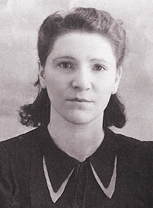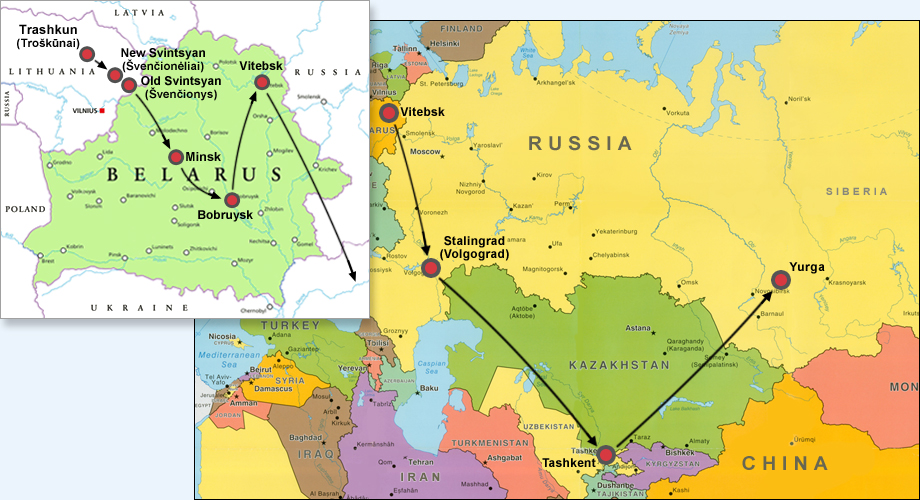Escape from Trashkun in 1941
by Zelda Yuzent Kotkis (1924-2016)
Translated from Hebrew
✷ See also: Yuzent family

Zelda Yuzent Kotkis
(~1948)
ON 23 JUNE 1941, at 4:30 in the morning, I ran out of my house because I heard gunshots. I joined some friends and we ran to the woods. We hid in the woods for half a day while the sounds of gunshots and explosions continued. Then we heard a train coming so we ran through woods and fields toward the train. When it stopped at a railroad signal, we jumped into one of the cars.
After a few minutes, some people with guns came into the compartment and in German ordered us, “Hands up!” Then they body-searched all of us, and one of the Jews fought back. The Germans threw him out of the train and immediately started shooting in all directions. A few of the Jews were hit.
An hour later the train started to move, and towards evening we arrived at the small town New Svintsyan (Švenčionėliai). We got out of the train and went into a synagogue. Opposite the synagogue there was a church flying the flags of Lithuania and Nazi Germany.
Inside the synagogue we saw many Jews, including many dead and wounded. At 8:00 p.m. some Lithuanian fascists came in with weapons and threatened us, “Get out, or we’ll burn the synagogue with you in it!” So we left to go to a nearby forest.
Around the town there were armed people who stopped us and body-searched us. We wanted to get our belongings, and they mocked us, “Oh, you want to keep your belongings?” Then they started to take us to the forest to kill us. One of the Jews started to yell and we all ran toward the woods. The fascists started shooting, and two of us were wounded.
It was already dark by the time we reached the town of Old Svintsyan (Švenčionys). We met a woman there and asked her where we could hide. She told us to go to the school, which was not far away, and she promised to bring us food that night. At midnight our two wounded friends caught up with us.
The next morning (24 June 1941) at 4 a.m., we heard some noise. We looked out the window and saw people with carts. We asked them if we could go with them. They questioned us to make sure that we were not spies. Finally they agreed to take us and we left with them. For the rest of the day, we walked along a road until German airplanes started circling overhead, shooting at us. We all ran to into a forest.
After a day or two we arrived at Minsk. The city was burning so we couldn’t stay there. Instead we kept walking to Bobruysk. It took us a few days, and we had nothing to eat or drink. We passed many small towns and forests. The German planes were still shooting at us, and we walked all the way to Vitebsk. At Vitebsk we got on a train and traveled for six days in the direction of Stalingrad (now Volgograd). On the way, there were more German airstrikes.
When we arrived at a station 80 kilometers from Stalingrad, we were sent to a kolhoz (collective farm). We lived and worked there until December 1941. Then the German army was coming closer to the kolhoz so we were sent to Tashkent (Uzbekistan). In Tashkent I got very sick with typhus and had to spend two months in a hospital. When I got out of the hospital, I was extremely thin. I had to leave the kolhoz because the Uzbeks were not giving us enough to eat or drink. After two hard years, my uncle Berl found me and took me to join him in Siberia. I stayed with him and worked there until the end of the war.

Zelda escaped from Lithuania through Belarus and Russia to Uzbekistan, and finally to Siberia.
NOTES
See references to Zelda (Zeldka) in Berl Glezer's memoir, Part II.
After the war, Zelda returned to Lithuania with Berl Glezer's family. Not long after, she moved to Birobidzhan, where she married her cousin Misha Kotkis and raised two sons. In 1995, the family made Aliyah to Israel. Zelda died in Israel in 2016.
PHOTOS • Zelda Yuzent as a child with her family (Trashkun, 1933)
• Zelda with her husband Misha Kotkis and their first son
• Zelda's family visits the Glezer family in Vilnius (1958)

